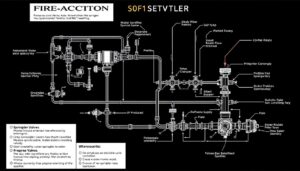Are you tired of stepping onto your lush, green lawn only to be greeted by an unpleasant odor emanating from your sprinkler water? It’s like a dark cloud raining down on your outdoor oasis. But fear not, for we have the answers to why your sprinkler water smells and how to eliminate those offensive odors.
Water is essential for the health and vitality of your lawn, but sometimes it can carry unwanted scents that leave you questioning its purity. In this article, we will explore the possible causes behind these odors – from musty and earthy smells to that distinct chlorine-like scent.
Through testing and analysis, we’ll uncover the root of these odors, providing you with actionable solutions to treat them effectively. Whether it’s consulting a professional or implementing education and awareness strategies, we’ve got you covered.
So say goodbye to those stinky surprises when watering your lawn! With our expert guidance, you can enjoy odor-free sprinkler water and revel in the refreshing experience of a pristine outdoor space.
Let’s dive in and reclaim the fresh scent of nature!
Possible Causes of Odor in Sprinkler Water
One possible reason for the unpleasant smell in sprinkler water could be due to the presence of stagnant leaves and debris that’ve been sitting in the system for too long. When sprinklers aren’t used regularly, organic matter can accumulate and decompose, releasing compounds that produce an odor.
To determine if this is the cause, testing methods such as microbial analysis can be employed. This involves collecting water samples from different areas of the sprinkler system and analyzing them for the presence of bacteria and fungi that may contribute to the smell.
Another common contaminant that can cause an unpleasant odor in sprinkler water is iron bacteria. These microorganisms thrive in environments with high levels of iron, which can come from corroded pipes or well water sources. Iron bacteria produce a slimy biofilm that gives off a distinct earthy or metallic smell.
In addition to stagnant leaves, debris, and iron bacteria, other potential causes of odor in sprinkler water include sulfur compounds from decaying organic matter or hydrogen sulfide gas from anaerobic conditions. These contaminants can arise when there’s poor drainage or low oxygen levels within the system.
Now let’s move on to discuss another type of odor frequently encountered in sprinkler water: the musty smell caused by mold and mildew growth.
Musty Smell in Sprinkler Water
The musty aroma in the sprinkler’s spray tickles your nose like an old attic. It’s a common complaint among homeowners who notice this unpleasant smell when using their sprinkler system.
To identify the source of the odor, various testing methods can be employed. One such method involves collecting a water sample and analyzing it for any microbial or organic contaminants that may be causing the musty smell. Additionally, water treatment techniques can be implemented to address this issue.
Musty odors in sprinkler water are often linked to the presence of bacteria or fungi. These microorganisms thrive in warm and damp environments, which can be found within irrigation systems. Regular cleaning and maintenance of sprinkler heads, pipes, and filters can help prevent the buildup of these microbes.
Water treatment methods such as chlorination or ultraviolet (UV) disinfection can effectively eliminate these microorganisms and eradicate the musty smell from sprinkler water. Chlorination involves adding chlorine to the water supply, while UV disinfection uses ultraviolet light to destroy harmful microorganisms.
By implementing proper testing methods and employing suitable water treatment techniques, you can ensure that your sprinkler water remains free from any musty odors caused by microbial contamination.
Transitioning into our next section about the earthy smell in sprinkler water…
Earthy Smell in Sprinkler Water
Get ready to embrace the delightful earthy aroma that wafts through your garden when you turn on your sprinklers. This natural scent is a result of various factors and can add an enchanting touch to your outdoor experience.
To better understand the earthy smell in sprinkler water, testing methods have been developed to analyze its composition. These tests involve analyzing the water for organic compounds, such as geosmin and methylisoborneol, which are produced by certain bacteria and algae present in lakes, rivers, or groundwater sources.
- Microbial activity: The earthy smell may be caused by microorganisms thriving in the water source.
- Seasonal variations: The intensity of the earthy smell can fluctuate depending on weather conditions and changes in microbial populations.
- Water treatment: Certain treatment processes used to purify water can affect its odor profile.
- Natural remedies: Incorporating vegetation buffers or using rainwater harvesting systems can help reduce the presence of organic compounds causing the earthy smell.
As we explore further into understanding different odors in sprinkler water, let’s now dive into another intriguing topic – the chlorinated smell that sometimes accompanies it.
Chlorinated Smell in Sprinkler Water
Experience the invigorating scent of chlorine as it mingles with the refreshing mist of your sprinklers. Chlorine is commonly used in sprinkler systems to disinfect and kill bacteria present in the water. It acts as a powerful oxidizing agent, effectively eliminating harmful microorganisms that could pose health risks.
This addition of chlorine helps ensure that the water sprayed by your sprinklers is safe for use on lawns and plants. While chlorine is effective in maintaining water quality, some individuals may find its smell unpleasant or overpowering.
Fortunately, there are alternatives available for those who prefer a different scent or have concerns about potential health effects associated with chlorine exposure. Several companies offer chlorine alternatives that can be added to sprinkler systems. These alternatives provide similar disinfection benefits without the distinct odor associated with chlorinated water. Additionally, they may address specific health concerns related to chlorine exposure, such as skin irritation or respiratory issues.
While some people enjoy the invigorating scent of chlorinated water from their sprinklers, others may prefer alternative options due to personal preference or health concerns.
Now let’s delve into testing and analyzing sprinkler water to ensure optimal safety and performance without compromising on fragrance or effectiveness.
Testing and Analyzing Sprinkler Water
Delving into the depths of sprinkler water, we can uncover its true essence by subjecting it to rigorous testing and analysis. Analyzing water quality is crucial in identifying contaminants that may contribute to the unpleasant smell.
Here are four steps to help you understand the composition of your sprinkler water:
- Sampling: Collect a representative sample of your sprinkler water in a clean container. Ensure that the sample is taken from an active zone where the odor is noticeable.
- Laboratory Testing: Take the collected sample to a certified laboratory for comprehensive testing. They’ll analyze various parameters such as pH levels, chlorine content, and presence of harmful substances like bacteria or algae.
- Identifying Contaminants: The laboratory results will help identify any potential contaminants present in your sprinkler water. These could include excess chlorine, organic matter buildup, or even pollutants from external sources.
- Recommendations: Based on the test results, experts can provide recommendations on how to improve your water quality and eliminate the unpleasant odor from your sprinkler system.
By understanding and addressing these factors affecting water quality, you can take preventive measures for odor-free sprinkler water moving forward without compromising on its effectiveness for irrigating your lawn or garden areas.
Preventive Measures for Odor-Free Sprinkler Water
By taking proactive steps, you can ensure your sprinkler system produces refreshing and fragrant water that enhances the beauty of your lawn or garden. Preventing contamination and maintaining water quality are crucial for odor-free sprinkler water.
Firstly, it’s important to regularly clean and maintain your sprinkler system. Debris, such as leaves or dirt, can accumulate over time and lead to unpleasant odors in the water. Inspect the nozzles and filters for any clogs or blockages that could affect the water quality.
Secondly, consider using a backflow prevention device. This device prevents contaminated water from flowing back into your main water supply and ensures that only clean water reaches your sprinklers. Additionally, be mindful of what goes into your lawn or garden. Avoid using chemicals or fertilizers near the sprinkler heads as they can contaminate the water.
Lastly, monitor the pH levels of your sprinkler water regularly. High pH levels can contribute to foul-smelling water. Test kits are available at hardware stores to help you determine if adjustments need to be made.
By implementing these preventive measures, you can maintain high-quality sprinkler water without any unpleasant odors. Transitioning into treating odor in sprinkler water, there are also effective methods available to eliminate any existing smells without compromising on cleanliness and safety.
Treating Odor in Sprinkler Water
Treating odor in sprinkler water can be achieved through various methods, and it’s interesting to note that a study found that adding a small amount of vinegar to the water can effectively neutralize unpleasant smells.
Odor in sprinkler water is often caused by the presence of odor-causing bacteria and chemical contaminants. To treat this issue, one approach involves using chlorine or hydrogen peroxide as disinfectants to eliminate bacteria and prevent their growth. These chemicals work by oxidizing the organic matter present in the water, which helps reduce foul odors.
In addition to treating odor-causing bacteria, it’s also important to remove any chemical contaminants that may contribute to the unpleasant smell. Activated carbon filters are commonly used for this purpose as they have a high adsorption capacity for organic compounds, such as pesticides or fertilizers, that can cause odors in sprinkler water.
It’s worth mentioning that while these methods can be effective for most cases of odor in sprinkler water, some instances may require professional assistance. If you’ve tried various treatments but are still experiencing persistent odor issues, consulting a professional can help identify any underlying problems and provide appropriate solutions.
Consulting a Professional
If you’re still struggling with persistent odor issues in your sprinkler system, it might be time to seek professional assistance. Consulting a professional can provide you with valuable advice and help you find effective solutions to tackle the problem at its source.
A professional can conduct a thorough assessment of your sprinkler system and identify any underlying issues that may be causing the water to smell. They have the knowledge and expertise to recommend appropriate treatments or modifications to eliminate the odor.
To emphasize the importance of seeking professional help, consider the following table:
| Benefits of Consulting a Professional | Drawbacks of Not Seeking Professional Assistance |
|---|---|
| Accurate diagnosis and solutions | Wasting time and money on ineffective remedies |
| Access to specialized equipment | Potential damage to the sprinkler system |
| Expertise in treating odor issues | Continued unpleasant odor in the water |
Seeking professional advice ensures that you receive accurate information tailored to your specific situation. It is essential for finding long-term solutions that address the root cause of the odor. By taking this step, you can gain valuable education and awareness about maintaining a healthy and functional sprinkler system.
Education and Awareness
Learn about the importance of education and awareness in maintaining a healthy sprinkler system, as it can help you prevent potential issues that could cost you hundreds or even thousands of dollars to fix.
Raising awareness about the importance of water quality is crucial in ensuring that your sprinkler water remains odor-free. By understanding the factors that can affect water quality and taking appropriate measures, you can avoid unpleasant smells and maintain a clean and efficient system.
Education plays a vital role in this process. It’s essential to learn about the potential contaminants that could be present in your water source, such as minerals, bacteria, or chemicals. Understanding their impact on your sprinkler system will help you identify warning signs early on and take necessary actions before any serious damage occurs.
Being aware of proper maintenance techniques is equally important. Regularly inspecting and cleaning your sprinkler system ensures that it functions optimally and prevents any build-up or blockage that may lead to foul-smelling water.
By raising awareness and prioritizing education about the importance of water quality in maintaining a healthy sprinkler system, you can prevent potential issues from arising. This knowledge empowers you to take proactive steps towards enjoying odor-free sprinkler water without relying solely on costly professional assistance.
Conclusion: Enjoying Odor-Free Sprinkler Water
To fully appreciate the refreshing benefits of your sprinkler system, it’s time to embrace the joy of odor-free water. Here are four key ways to prevent odor formation and enjoy a delightful watering experience:
- Regular Maintenance: Ensure that your sprinkler system is properly maintained by cleaning and inspecting it regularly. This includes checking for clogged nozzles or filters, as debris buildup can lead to foul-smelling water.
- Proper Water Source: Use clean, fresh water from a reliable source for your sprinkler system. Avoid using stagnant or untreated water, as it can contain bacteria and other impurities that contribute to unpleasant odors.
- Adequate Drainage: Ensure that your sprinkler system has proper drainage to prevent standing water from accumulating in the pipes or around the sprinkler heads. Stagnant water creates an ideal environment for bacteria growth and foul odors.
- Regular Flushing: Periodically flush out your irrigation lines with clean water to remove any accumulated sediments or organic matter that may promote odor formation.
By following these preventive measures, you can enjoy the numerous benefits of odor-free water from your sprinkler system. Odor-free water not only enhances the overall outdoor experience but also ensures healthier plants and a more pleasant environment for all who enjoy it.
Frequently Asked Questions
How do I know if the odor in my sprinkler water is harmful to my health?
To determine if the odor in your sprinkler water poses health risks, you should consider the water quality. Assess factors such as the presence of contaminants, bacteria, or chemicals that may contribute to the smell.
If your sprinkler water is sourced from a public supply, it’s typically treated and monitored for safety. However, if you have a private well or use untreated water, there may be a higher chance of harmful substances.
It’s recommended to test your water regularly for potential health hazards.
Can the smell in my sprinkler water be caused by a problem with my sprinkler system?
If you’re detecting an unpleasant smell in your sprinkler water, it’s possible that there might be an issue with your sprinkler system. This could be due to a number of common causes such as stagnant water, mold or bacterial growth, or even chemical contaminants.
Smell detection is an important tool in identifying potential problems with your system and taking appropriate action to resolve them. It’s essential to address these issues promptly to ensure the safety and effectiveness of your sprinkler system.
Are there any natural remedies or DIY solutions to eliminate the odor in my sprinkler water?
To eliminate the odor in your sprinkler water, there are natural remedies and DIY solutions you can try. One option is to use vinegar, which has antimicrobial properties that can help neutralize odors. You can add a cup of white vinegar to every gallon of water used in your sprinkler system.
Another solution is to use activated carbon filters, which can effectively remove contaminants and unpleasant smells from the water. These methods provide natural and cost-effective ways to improve the quality of your sprinkler water.
Can the odor in my sprinkler water affect the plants in my garden?
The odor in your sprinkler water can have a significant impact on the growth of plants in your garden. Certain smells may indicate the presence of harmful chemicals or bacteria, which can hinder plant development and potentially pose health risks.
These pollutants can disrupt nutrient uptake and interfere with essential biological processes. It’s crucial to address the issue promptly to ensure the well-being of your plants and maintain a healthy garden environment.
Are there any specific regions or climates where sprinkler water is more likely to have an odor?
Sprinkler water can have an odor in certain regions or climates because of various factors. These factors include the presence of minerals, organic matter, or bacteria in the water source. Regions with high mineral content in their water supply may experience a metallic smell. Climates with warm temperatures and stagnant water can create favorable conditions for bacterial growth, resulting in a musty or rotten odor. Understanding these factors can help identify and address the specific causes of odor in sprinkler water.

I’m Carlos Robert, a passionate gardener, and blogger. With years of experience and knowledge in the field of garden watering, I have created a blog to share my insights and tips on the topic. I strive to provide readers with detailed information about all aspects of sprinkler systems, from garden sprinklers to fire sprinklers, along with nozzles, hoses, and other related products. I love helping my readers create the perfect garden with their ideal setup!

